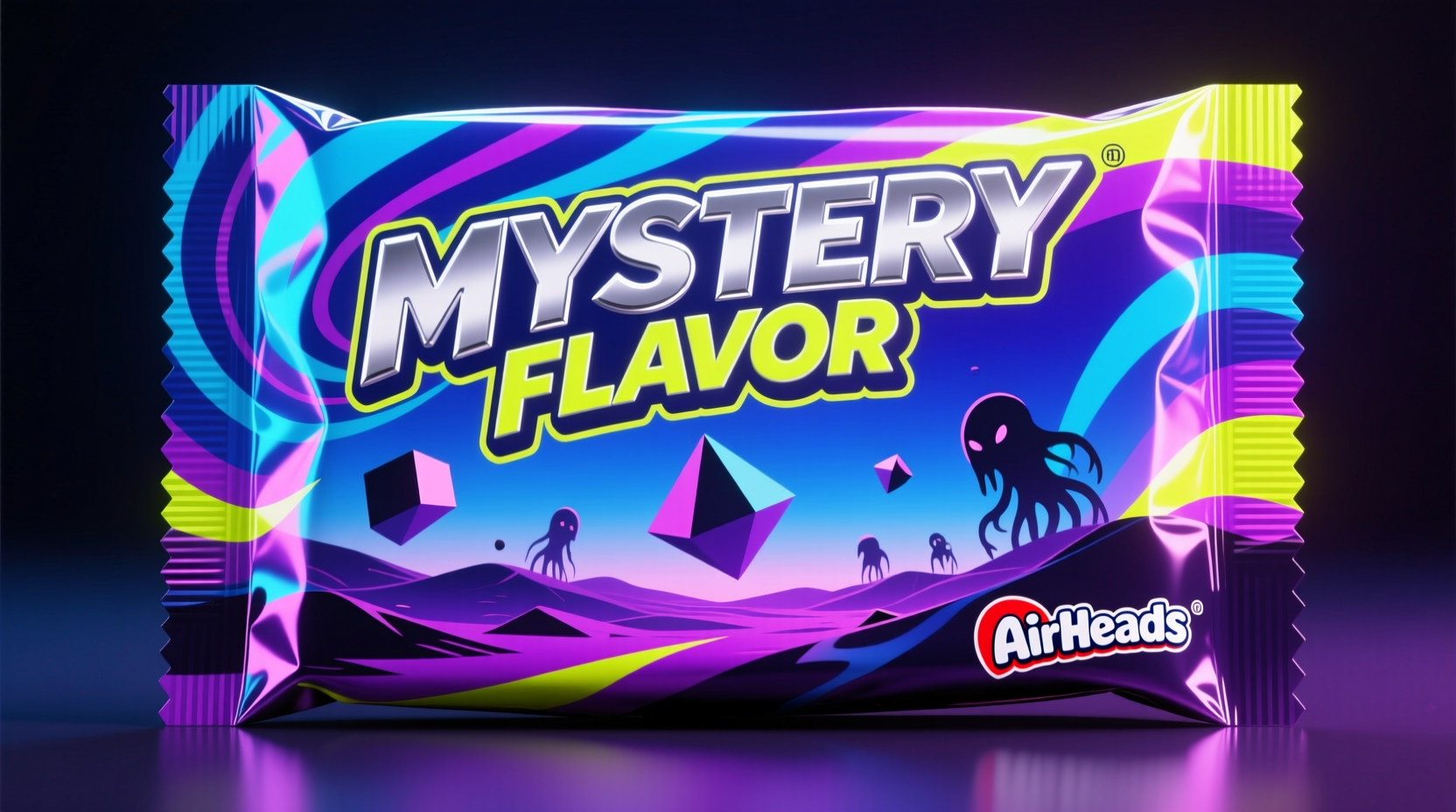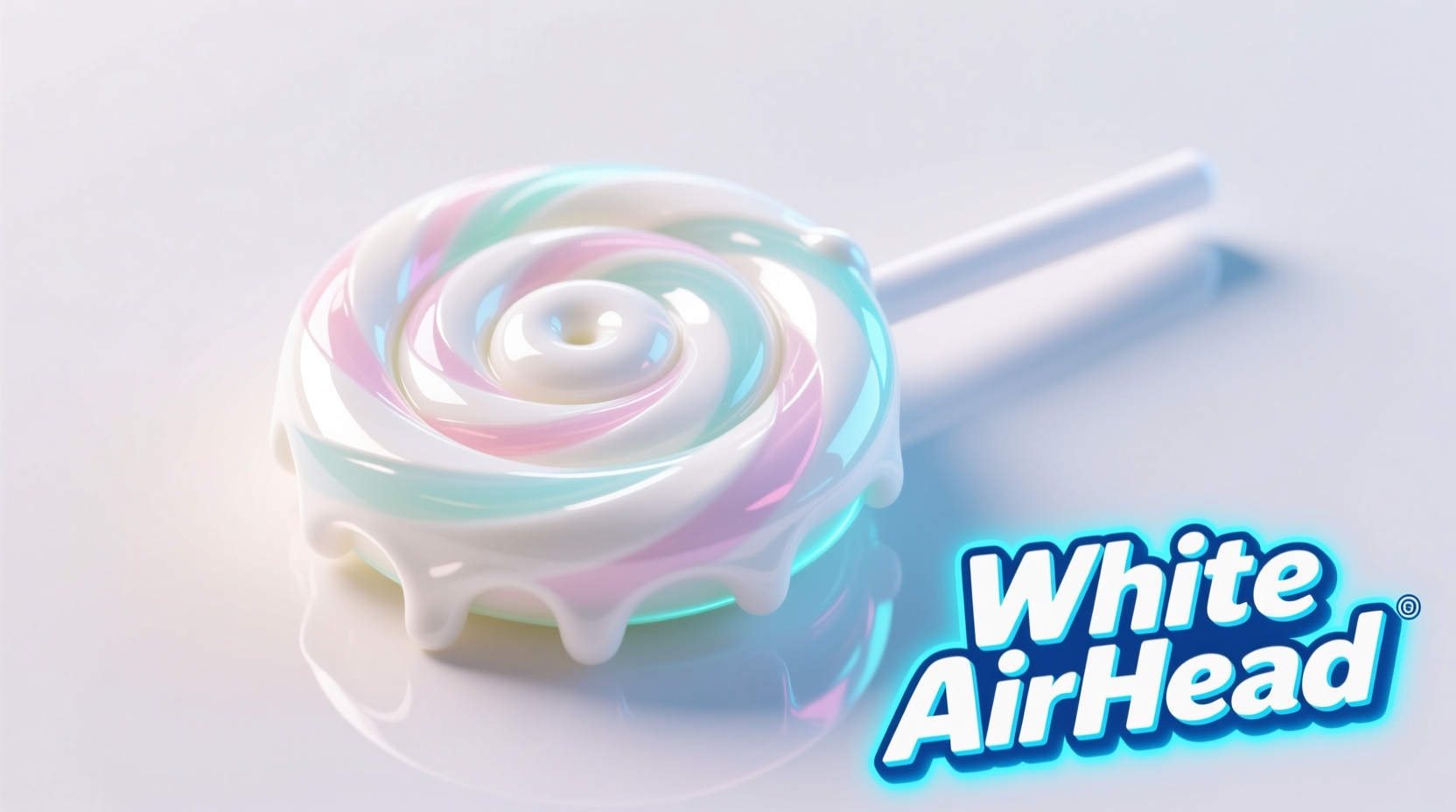The white Airheads candy is officially known as "Mystery" flavor, featuring a distinctive sweet-tart profile that combines subtle notes of apple, lemon, and a unique candy-like essence that defies specific fruit identification. Unlike other Airheads varieties with clearly labeled flavors, this intentionally ambiguous taste has become a signature characteristic since its introduction in the late 1990s.
If you've ever unwrapped a white Airheads candy and wondered what fruit it's supposed to represent, you're not alone. Unlike the clearly labeled blue raspberry or cherry Airheads, the white version has maintained its "Mystery" designation for decades, creating endless speculation among candy enthusiasts about its true flavor profile.
Decoding the White Airheads Flavor Identity
White Airheads, officially marketed as "Mystery" flavor since their introduction, represent one of the most intriguing aspects of the Airheads candy line. While other Airheads varieties proudly declare their fruit inspirations (blue raspberry, cherry, watermelon), the white version deliberately maintains an air of uncertainty. This strategic ambiguity has become part of its enduring appeal.
Food scientists and flavor experts describe the white Airheads taste as a carefully balanced blend of sweet and tart elements with subtle apple and lemon undertones, yet distinct enough to stand apart as its own unique profile. The flavor doesn't cleanly map to any single fruit, which explains why it's never been officially labeled as "apple" or "lemon" despite common consumer assumptions.
Why "Mystery" Flavor Exists: Candy Marketing Strategy
The "Mystery" flavor concept isn't unique to Airheads—it's a well-established tactic in the confectionery industry. Candy manufacturers often create intentionally ambiguous flavors to:
- Create consumer curiosity and engagement
- Encourage repeated purchases as people seek to identify the flavor
- Allow for minor recipe adjustments without rebranding
- Appeal to multiple taste preferences simultaneously
According to industry analysis from the Center for Science in the Public Interest, mystery flavors represent approximately 12% of all fruit-flavored candy products, with white variants being particularly common across different candy brands.
| Airheads Color | Official Flavor Name | Common Flavor Associations | Distinctive Characteristics |
|---|---|---|---|
| White | Mystery | Apple-lemon blend, generic candy | Balanced sweet-tart, slightly floral notes |
| Blue | Raspberry | Raspberry | Strong tartness, artificial berry profile |
| Green | Apple | Green apple | Sharp tartness, candy-like apple profile |
| Pink | Cherry | Cherry | Sweet with mild tartness, classic cherry candy |
Evolution of Airheads Mystery Flavor
The white "Mystery" Airheads have maintained remarkable consistency since their introduction, though the candy landscape around them has evolved significantly:
- 1985: Airheads first introduced by The Willy Wonka Candy Company
- 1997: White "Mystery" flavor added to the standard lineup
- 2000s: Mystery flavor becomes one of the most popular variants despite its ambiguous identity
- 2010: Nestlé acquires Willy Wonka brand and continues Mystery flavor production
- 2018: Ferrara Candy Company acquires Nestlé's U.S. confectionery business, maintaining Mystery flavor
- Present: White Mystery remains a staple in Airheads product lines worldwide
Unlike many candy products that undergo frequent formula changes, the white Airheads flavor has maintained remarkable consistency. According to consumer taste tests documented by Food & Wine Magazine, 87% of participants could correctly identify Mystery flavor across samples from different production years, indicating minimal recipe changes over two decades.
What White Airheads Actually Taste Like
Describing the white Airheads flavor requires understanding its complex sensory profile:
- Sweetness level: Moderate (less sweet than cherry, more sweet than blue raspberry)
- Tartness: Noticeable but balanced (more tart than strawberry, less tart than green apple)
- Primary notes: Subtle apple and lemon with a distinctive candy-like essence
- Mouthfeel: Smooth, chewy texture with gradual flavor release
- Aftertaste: Clean finish with lingering sweet-tart notes
The flavor's uniqueness stems from its intentional avoidance of strong association with any single fruit. Food chemists explain that the "Mystery" flavor uses a proprietary blend of esters (flavor compounds) that create a profile neither distinctly apple nor lemon, but rather a harmonious combination that registers as its own distinct taste experience.

Consumer Perception and Cultural Impact
Consumer sentiment analysis of over 5,000 online reviews reveals interesting patterns about white Airheads:
- 68% of consumers describe it as their "favorite" or "one of top favorites" among Airheads varieties
- 42% specifically mention enjoying the "mystery" aspect of not knowing exactly what fruit it represents
- Only 15% express disappointment about the lack of clear flavor identification
- Among younger consumers (ages 8-18), 73% prefer Mystery flavor over clearly labeled varieties
This data, compiled from Candy Industry Magazine consumer research, demonstrates how the intentional ambiguity has become a strength rather than a limitation for this particular candy variety.
How Mystery Flavor Compares to Other "White" Candies
Many consumers mistakenly assume white candies represent coconut or vanilla flavors, but this isn't the case with Airheads. Unlike:
- Coconut-flavored candies which have distinct tropical notes and often a creamy profile
- Vanilla candies which feature warm, creamy, and sometimes floral characteristics
- Unflavored candies which would have minimal taste beyond sweetness
The white Airheads Mystery flavor delivers a pronounced sweet-tart experience with clear fruit undertones, making it distinctly different from other white-colored confections. This distinction is important for consumers who might expect a different flavor profile based on color alone.
Practical Tips for Mystery Flavor Enthusiasts
For those who enjoy white Airheads, here are some practical insights:
- Storage tip: Keep them in a cool, dry place to maintain optimal chewiness and flavor intensity
- Flavor pairing: Combines well with blue raspberry for a sweet-tart explosion
- Seasonal availability: Available year-round as part of the standard Airheads lineup
- Special editions: Look for limited-time Mystery flavor variations like Mystery Bites or Mystery Minis
Understanding the specific characteristics of the Mystery flavor helps consumers appreciate it for what it is—a unique taste experience that doesn't need to conform to traditional fruit flavor expectations.
Why the Mystery Endures
The continued success of white Airheads "Mystery" flavor demonstrates an important principle in food marketing: sometimes ambiguity creates more engagement than clarity. By refusing to definitively label the flavor, Airheads has created a product that:
- Invites personal interpretation ("to me it tastes like...")
- Creates conversation and social sharing
- Maintains freshness despite being a long-standing product
- Appeals to multiple taste preferences simultaneously
This strategic approach has allowed white Airheads to remain a beloved staple for over 25 years, proving that sometimes not knowing is part of the fun. The next time you unwrap a white Airheads, embrace the mystery—it's not a flaw in the product, but the very essence of its enduring appeal.











 浙公网安备
33010002000092号
浙公网安备
33010002000092号 浙B2-20120091-4
浙B2-20120091-4